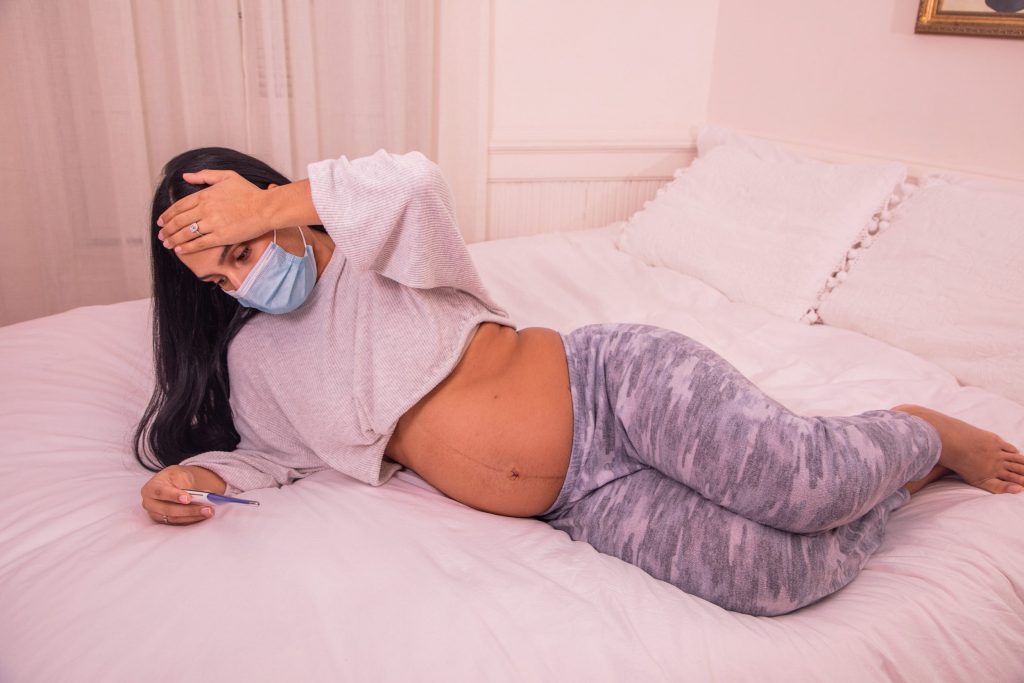- Breakthrough COVID is more likely in pregnant women than in those with 11 other health conditions.
- The study suggests vaccinated pregnant women take precautions like mask-wearing, and may be candidates for a 4th dose.
- Contracting COVID-19 while pregnant is still far riskier if you're unvaccinated.
Vaccinated pregnant women are more likely to contract COVID-19 than vaccinated people with cancer, organ transplants, and immune system deficiencies, a study released Thursday found.
In fact, breakthrough cases are more likely in pregnant people than in people with all of the 11 other health conditions studied, including heart, kidney, and liver disease.
While other factors besides pregnancy may explain the findings, the study raises questions about whether pregnant folks should be encouraged to get a second booster shot and when during the perinatal period is the best time to get vaccinated.
It does not mean the shots are ineffective. While the study didn't track how sic pregnant patients got from COVID-19, other research suggests they fare well, since almost all pregnant patients admitted to ICUs have been unvaccinated.
The study looked at nearly 14 million patients
To conduct the analysis, published by Epic Research, researchers looked at the medical records of 13.8 million patients between January 2021 and January 2022.
In order to see how various conditions affected vaccinated people's COVID-19 risk, they analyzed pairs in which one person had the condition being looked at and one did not. For example, they looked at how likely a vaccinated person with lung disease was to contract COVID-19 compared to a vaccinated person from the same community without lung disease.
The researchers found pregnant people were the most vulnerable to COVID-19, having a 91% higher likelihood of infection than those who weren't pregnant. Organ donation recipients had an 83% increased risk, and those with immune system deficiencies had 63% greater odds of infection.
People with cancer and those with Down syndrome were actually less likely to contract COVID-19, and people with heart disease had no greater risk than those without heart disease.
The researchers didn't speculate on why pregnancy seems to make people especially susceptible to COVID-19, even if they're vaccinated. It could have to do with how pregnancy suppresses the immune system, or it's possible the current vaccine doses available may not be sufficient for pregnant people's rapidly developing bodies.
Other factors could explain the findings, too, like that pregnant women are in closer contact with the healthcare system and therefore more regularly tested than, say, people with heart disease, Duke OB-GYN Dr. Brenna L. Hughes told the Washington Post.
It's also possible that pregnant people are more often in situations where they're exposed to COVID-19, since many work and go about daily life in a way that cancer patients, for example, may not.
The researchers say their results support the CDC's recommendation for people with comorbid conditions to take extra precautions against the disease, like mask-wearing in public.
Experts continue to urge vaccination during pregnancy
While the numbers are ticking up, pregnant patients have been among the most resistant to vaccination. Some point to the absence of clinical trial data, concerns about putting something so new into their bodies, and anti-vaccine misinformation. Most didn't even know the shot was recommended by the CDC, one survey found.
But experts say it's now clear that getting COVID-19 is a lot riskier than getting the vaccine in pregnancy.
One large study conducted before vaccines were available found pregnant patients were more than five times as likely to be admitted to the ICU if they had COVID-19. They were also more than 14 times as likely to need intubation, and more than 15 times as likely to die. Other research has linked COVID-19 in pregnancy to an increased risk of preterm birth.
Among those who have been vaccinated while pregnant, scientists have seen no red flags or increased risk of complications.
But a lot of patients don't fully trust that data until it's too late, Dr. Jessica Shepherd, an OB-GYN in Dallas, Texas, previously told Insider. By the time they get to the end stages of the disease progression, she said, "a lot of the time when they get to that point, they're like, 'Can I still get it?' and wish they had gotten it, and that's a hard conversation to have."

